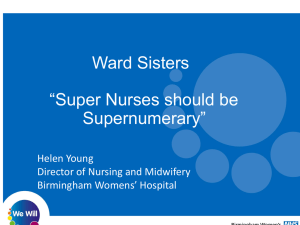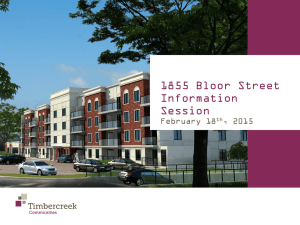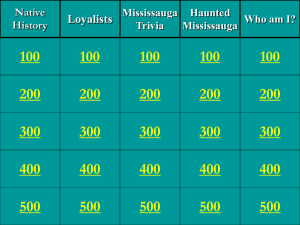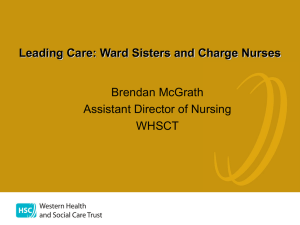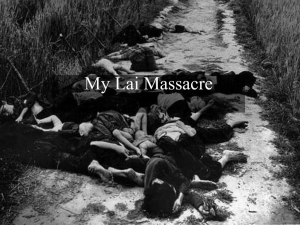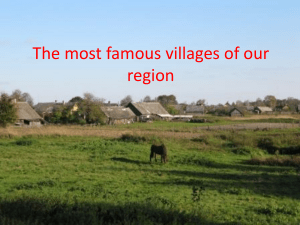Ward 3 - Heritage Mississauga
advertisement
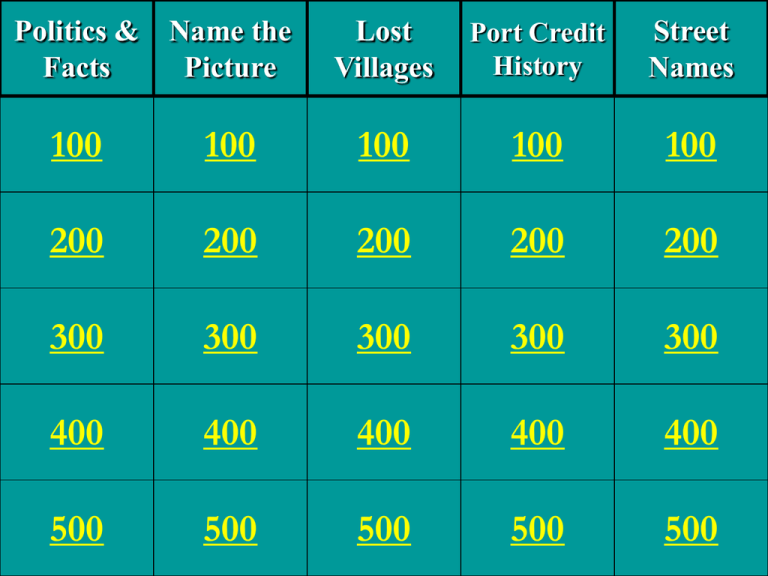
Politics & Facts Name the Picture Lost Villages Port Credit History Street Names 100 100 100 100 100 200 200 200 200 200 300 300 300 300 300 400 400 400 400 400 500 500 500 500 500 Question: Prior to becoming the City of Mississauga, how Mayors did the Town of Mississauga have? Answer: One. Robert Speck He served as the only Mayor of the Town of Mississauga, from 1967 until his death in 1972. Question: Who was the first woman to enter municipal politics in Toronto Township (Mississauga)? Answer: Mary Fix. Mary Fix was the first woman to enter politics in the township. She was elected Reeve in 1955 and re-elected in 1957 and 1958. In 1959 she became the first woman Warden of Peel County, and was again elected Reeve in 1961. Question: What year was Hazel McCallion first elected mayor? Answer: 1978. Question: How many consecutive terms of office has Mayor Hazel McCallion served? Answer: Mayor Hazel McCallion has served 11 consecutive terms of office. Question: Who is currently the longest serving Ward Councillor in the City of Mississauga? A) Frank Dale B) Patricia Mullin C) Maja Prentice Answer: Both Patricia Mullin & Maja Prentice were elected to Mississauga City Council in 1985, and are the longest councillors. Mayor Ward 1 Ward 2 Ward 3 Ward 4 Ward 5 - Hazel McCallion (1978) - Carmen Corbasson (1994) - Patricia Mullin (1985) - Maja Prentice (1985) - Frank Dale (1988) - Eve Adams (2003) Ward 6 Ward 7 Ward 8 Ward 9 Ward 10 Ward 11 - Carolyn Parrish (2006) - Nando Iannicca (1988) - Katie Mahoney (1992) - Pat Saito (1991) - Sue McFadden (2006) - George Carlson (2000) Question: What plane appears in this picture? Answer: The Lancaster Bomber. Produced in Malton, the first bomber rolled out in August, 1943. Question: Where was this picture taken? Answer: The Dundas Street Bridge over the Credit River, circa 1905. Question: What building is this? Answer: The Government Inn, built circa 1796 near the mouth of the Credit River. Question: What does this picture show? Answer: The explosion from the Mississauga Train Derailment on November 10th, 1979. Question: Who am I? Answer: Sir John Beverly Robinson He was the first Chief Justice of Upper Canada and built “The Grange” around 1830. Question: This “lost village” was named in honour on the Governor General of Canada from 1868 – 1872. Answer: Lisgar. Formerly known as Switzer’s Corners, Lisgar took its name in honour of Sir John Young, 1st Baron of Lisgar, Governor General of Canada, 1868-1872. Question: This “lost village” was located around the intersection of Dundas Street and the Etobicoke Creek. What was it called? Answer: Summerville. Question: This “lost village” was reportedly named after early settler Charles King. What was it called? Answer: Mount Charles (Also known as King’s Crossing) Question: What was the crossroads hamlet of “Frogmore” named in reference to? Answer: Frogmore, once located around the interesection of Dundas Street and Winston Churchill Blvd. was named in honour of the birthplace of Queen Victoria, although another early claim suggests that it was named for the large number of frogs located in a nearby marsh. Question: This “lost village” was located around the intersection of Mississauga Road and Derry Road, and was named in honour of a man nicknamed “Ginger”. What was it called? Answer: Harris’ Corners “Ginger” Harris was a hotel proprietor and stage coach operator. Question: When was the Village of Port Credit first surveyed? Answer: 1835 The Village lots in Old Port Credit Village were surveyed in 1835 by Robert Lynn. Question: What was the former street name for Mississauga Road South? Answer: Joseph Street Named in honour of Joseph Sawyer, a Chief of the Mississaugas Question: When did the original Port Credit Lighthouse burn down? A)1936 B)1918 C)1926 Answer: 1936. Built circa 1883, the first Port Credit Lighthouse was accidentally burned in 1936. True or False? The building known as the Masonic Temple once served as a Methodist Church? Answer: True. First consecrated as a Methodist Chapel in the 1840s, the building represents Port Credit’s first established place of worship, and has direct connection to early non-Native settlers and to the Native Mississaugas. The building was moved to its present location in 1894, serving as a community hall known as “Shaw’s Hall”, and was purchased by the Masonic Lodge in 1915. Question: Who was “John Street” named in honour of? Answer: John Jones Brother of Reverend Peter Jones. John was a chief of the Mississaugas, a Methodist Missionary and teacher. “Peter Street” is named after Peter Jones. Question: What is Burnhamthorpe Road named after? Answer: Burnhamthorpe Road takes it name from the “lost village” of Burnhamthorpe (also called Sandhill), that was located around the intersection of Dixie Road and Burnhamthorpe Road. True or False: Burnhamthorpe Road has had several other names in its past, including “Rogers Road”. Answer: True. Burnhamthorpe Road was also informally known as the “Back Line” and the “Sandhill Sideroad”, amongst other names. Question: What is Derry Road named in reference to? Answer: The “lost village” of Derry West, which was located around the intersection of Derry Road and Hurontario Street. Question: Who was Bristol Road named for? Answer: Richard Bristol A land surveyor who worked with Timothy Street. Question: Who was Dundas Street named for? Answer: Lord Henry Dundas He was the Secretary of War for the United Kingdom from 1794-1801.
